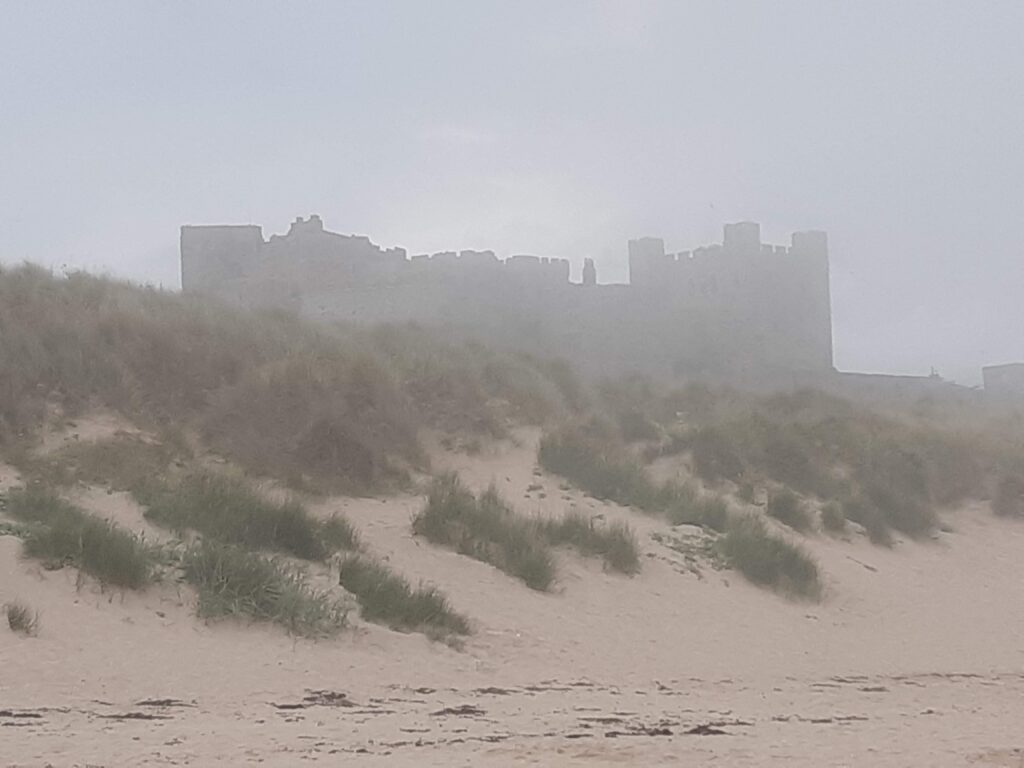In 655, there was no England. Rather, there were small Anglo Saxon kingdoms, often fighting each other. The longest running and heaviest-weight battle was Mercia versus Northumbria. Mercia can be thought of as the Midlands of what is now England, Northumbria as the North East of it. These two Anglo Saxon people groups had been fighting for generations. The rivalry was part of their sense of Identity.
As at 655, having won the latest battle between them, King Oswy of Northumbria faced a decision: what revenge to take on Mercia?
Mercia had been bullying and looting its Northumbrian rival since 633, when King Penda of Mercia, allied with Britonnic Celtic forces, had killed King Edwin and broken Edwin’s Northumbria in two. Penda had gone on to slay and dismember Saint King Oswald of Northumbria in 642; and after that, to set fires and to extract tribute. Now, as at 655, King Oswy of Northumbria, Oswald’s younger brother, was next up in Penda’s sights.
Oswy was a Christian King, but an ambivalent one, not a Christ figure like his more heroic brother, Oswald. And Oswy didn’t much like fighting either. He had bought off Penda up to 655. But it was not enough: in 655, Penda forced a final battle, the target: King Oswy’s head.
To the surprise of all, Oswy included, Penda lost his own head. Literally. For the first time in a generation, Mercia lost a battle. Imagine now the temptation of King Oswy. Mercia had previously looted Northumbria, so: loot the looter. Mercia had previously despoiled Northumbria, so: despoil the despoiler. Mercia had previously broken Northumbria in two, so: break Mercia back. Take revenge. It’s the way. It’s what we’ve always done.
Well, Oswy did divide Mercia into two administrative areas, ruling its northern part directly and its southern part through a sympathetic and newly Christian sub-King. But he refrained from revenge. Instead of sending in the swordsmen, Oswy sent the Christian Saints Marching In, secure under his authority. Their swords were words of the Christian God. And these Saints bore no resemblance to a modern caricature of religiosity. They were the Gaelic Celtic Anointed Brigade, descended spiritually from Saint Martin of Tours via Saints Ninian, Patrick, Columba and Aidan. Familiar with the realms of the revelatory and the miraculous. Sparky.
Mercia received them gladly and embraced the Christian message. It went on to embed it far and wide within proto-England. And even though the two powers remained tense militarily, their underlying sense of Identity began to change. Mercia took on a sense of Christian Identity derived from the Northumbrian one and, with that, an underlying Christian commonality began to replace the ancient military rivalry. In 679 the great Archbishop Theodore was able to bring the two powers to lasting peace on that foundation of common Christian Identity. It was a major step along the road to England.
The watershed moment, however, was this battle of King Oswy’s in 655. It was at Winwaed, near what is now Leeds. From that time onward the old pagan Anglo Saxon Identity represented by King Penda became like a tide in retreat. The new Christian Early English Identity represented by King Oswy became the tide rolling in.
Now, think carefully here. It is commonly understood that the Battle of Winwaed in 655 was a defining moment in the making of England. But we could be more accurate. It was King Oswy’s Christian decision to forgo vengeance and send in the Christians which was the defining moment in the making of England. Oswy’s power would soon be overthrown in Mercia. But the Christian Identity which he secured there would not be overthrown.
Now, I have read Oswy accused of Christian colonialism over his decision of 655. But Penda was the proto-colonialist. And what would we rather have had Oswy do? Take hideous revenge? Surely, his decision was born out of Christian wisdom and for the benefit of all? What’s not to like about a decision which introduced ways of peace into warrior-to-the-bone rivals?
King Oswy’s Christian decision came at the end of a long line of extreme and honourable extensions of Christian grace. It began with St Patrick, who extended Christian grace to the Gaels who had once enslaved him. That led on to St Columba, a direct descendant of Patrick’s enslavers. The Iona Monastery which St Columba founded went on to extend Christian grace to the young Oswald and Oswy of Northumbria, when they came to Celtic Iona as refugee children: sons of the violent Anglo Saxon invader: better to slay them, perhaps? But no, they led them to the Christ. Oswald, once grown up to become King in Northumbria, went on to extend Christian grace to Wessex in 635. Wessex had not long before attempted to assassinate the Northumbrian throne. The Christian treaty which Oswald extended to Assassin Wessex after that became the first building block of England. When Oswy replicated Oswald’s model of Christian grace to Mercia in 655, that became another building block of England.
So, to be more accurate in our thinking, it was the Christian decisions of Oswald and Oswy, not violence and the sword, that first built England. Battle secured the ground for Oswy’s decision in 655. But the Battle of Winwaed, 655, did not in and of itself build England. It was the Christian decision of King Oswy to send in the Saints, under what must have been enormous temptation to send in the killers, which built England. It is not too much to say that his decision helped to shape the world which descends to us down to this day.
